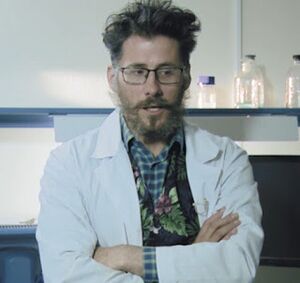Alexander Kagansky
( researcher, COVID-19/Premature death) | |
|---|---|
 | |
| Died | December 2020 St Petersburg, Russia |
Cause of death | fall, stabbing |
| Nationality | Russian |
| Alma mater | St. Petersburg State Polytechnical University |
| Interests | |
Russian COVID-19 Vaccine researcher found dead | |
Dr. Alexander "Sasha" Kagansky was a researcher working on a COVID-19 Vaccine[1] who died under suspicious circumstances.
Education
Kagansky received his Ph.D. in Molecular Biology in 2004 after spending three years at the U.S. National Institutes of Health. In 1998 he got his MS in Biophysics from from St. Petersburg State Polytechnical University in Russia.
Kagansky worked in Scotland between 2005 and 2012 (or 2017), including as a Chancellor's fellow at the Edinburgh-based Medical Research Council Human Genetics Unit, which "discovers how changes in our DNA impact our lives."
He was a former employee of the Wellcome Trust in Scotland and was also connected with the Maryland-based National Cancer Institute. Kagansky had also worked in Edinburgh on a vaccine against coronavirus infection.
Death
He was found dead in his underwear after falling 14 stories from his flat[2][3] with stab wounds.
The Fontanka.ru news website reported that he had been visiting an old schoolmate[4], a media manager or journalist named Igor Ivanov, for a birthday party on the day of his death, and stayed the night. The friend said they woke up in the morning after a party and the friend went to prepare a brunch. Kagansky went to the bathroom, grabbed a knife, stabbed himself and jumped from the 14th floor.
A mutual friend also suggested Kagansky had suffered stress in recent months. The following could equally suggest that he was facing external rather than internal pressure: "he became nervous, easily fell into depression, talked about imminent death. The acquaintances of the deceased note that the scientist had an exhausting schedule, he worked a lot and traveled around the country and abroad."
mRNA Injectables
Kagansky was a pioneer in synthetic epigenetics. This is the study of heritable phenotype changes that do not involve alterations in the DNA sequence. He had published papers on the manipulation of mRNA, the type of vaccines that are being rolled out across the world. These do not work like conventional vaccines.
The Gates-lobby group GAVI says mRNA cannot alter DNA as it "will only hang around inside a cell for about 72 hours, before being degraded." GAVI further adds, "Some viruses like HIV can integrate their genetic material into the DNA of their hosts, but this isn’t true of all viruses, and HIV can only do so with the help of specialised enzymes that it carries with it. MRNA vaccines don’t carry these enzymes."[5]
Kagansky would have been a leading expert on precisely this aspect of mRNA injectables.
Research
On the University of Edinburgh web site, Kagansky listed[6] his research activities:
My research in a nutshell: One of the most fundamental problems in modern biology is to determine mechanisms that underlie changes in genome regulation at the level of chromatin structure, as it defines gene expression and chromosome function and is linked to cancer, differentiation, ageing, and brain function. To address that, we must understand what changes occur upon the transformation between active and repressed chromatin states. Our goal is to understand the molecular mechanisms and role of such transitions in mammalian cells. To achieve this, we induce targeted chromatin changes using locus-specific targeting of chromatin modifiers. We also develop new chemical approaches to changing the chromatin structure.
References
- ↑ Most of the information her is was first gathered by https://moneycircus.blogspot.com/2020/12/death-of-vaccine-scientist.html
- ↑ https://www.mirror.co.uk/news/world-news/scientist-working-covid-vaccine-found-23199487
- ↑ https://nypost.com/2020/12/20/russian-scientist-working-on-covid-19-vaccine-plummets-to-death/
- ↑ https://www.fontanka.ru/2020/12/21/69645921/
- ↑ https://www.gavi.org/vaccineswork/will-mrna-vaccine-alter-my-dna
- ↑ https://www.research.ed.ac.uk/portal/en/persons/alexander-kagansky(6bf5575c-9599-46aa-8833-ec9b99a38641).html